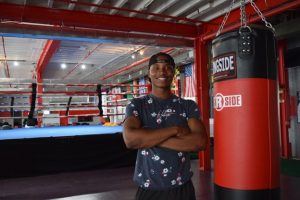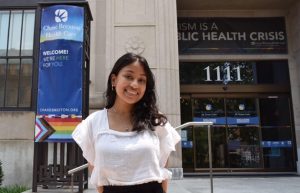
The Community Impact Internships Program (CIIP) bridges the gap between academia and action by providing Johns Hopkins undergraduates with summer internship opportunities at Baltimore City community groups, nonprofits, and government agencies. Run by the university’s Center for Social Concern since 2011, the program has placed students at more than 100 partner sites working directly with clients. CIIP interns have contributed more than 100,000 hours across a diverse range of fields, including tutoring programs, community centers, urban farms, and theaters.
Three participants from the Whiting School of Engineering describe their summer 2023 internship experiences here:
A rising second-year biomedical engineering major, Samson Dessalines interned as a STEM teacher and mentor at Corner Team, an East Baltimore gym that uses Olympic-style boxing and other programs to encourage healthy and active lifestyles and to cultivate and nurture leadership and life skills among youth, senior citizens, and people with disabilities. He believes that the engineering skills he brought to this role made him a better teacher. “Whenever I use problem-solving skills in my work, I try and be creative. You definitely need to be a problem-solver for this, including figuring out what activities to do to get them [the students] involved,” he said.
 Throughout his internship, Dessalines took part in the organization’s community days, during which he and the students cleaned up vacant lots— an experience showed him how mutual support contributes to the life of a community. “Whenever we come out to lots to clear and clean, we would see a lot of support from the community members,” he said. He also noted that, in Baltimore, “The community isn’t used to receiving a lot of help from others. I learned that they don’t see a lot of help or support from organizations like this.”
Throughout his internship, Dessalines took part in the organization’s community days, during which he and the students cleaned up vacant lots— an experience showed him how mutual support contributes to the life of a community. “Whenever we come out to lots to clear and clean, we would see a lot of support from the community members,” he said. He also noted that, in Baltimore, “The community isn’t used to receiving a lot of help from others. I learned that they don’t see a lot of help or support from organizations like this.”
But the community and the kids spending time at Corner Team were not the only beneficiaries of the CIIP program, according to Dessalines. He, too, learned a lot.
“[The students I worked with really] motivated me. One of them told me that they have to bike an hour to get here sometimes. I just thought to myself, ‘Oh, I got to really lock in, push myself,” he said.
Dessalines said he was grateful for the opportunity and plans to return to CIIP next year to keep helping the community and learning from them, too.
Rebecca Baxter, a rising third-year majoring in biomedical engineering, interned at the Station North Tool Library, a nonprofit that provides access to 3,000 tools and dozens of classes, as well as a woodworking shop, a DIY workspace, and a home-repair classroom. This was Baxter’s second summer with CIIP, which she credits with “helping me feel like Baltimore is actually my home.” As a returning student, she added mentoring first-timers to her responsibilities working with members of the community using the tool-lending center.
“I wanted to be able to give back to the new interns,” she said.
Interactions with the variety of people accessing the Tool Library were the highlight of Baxter’s summer CIIP experience. She said they exemplify the character of Baltimore City.
“I think the people of Baltimore are very self-sufficient and have a do-it-yourself energy. There’s a lot of grit and determination to learn something on your own, which I think is really cool. I also think the tool library is a more formal model of what you can see in a lot of neighborhoods around the city, with people sharing skills and tools or resources,” she said.
Baxter’s experience at CIIP has even changed her career plans. Formerly, she envisioned herself focusing on biomedical research. Now she wants to work to increase accessibility to the products of such research and to find ways “that biomedical engineering can overlap with community building or equity within health care.”
Aamilah Chowdhury, a fourth-year biomedical engineering student, served as a CIIP intern at Chase Brexton Health Center in Mt. Vernon. The facility offers integrated health care that “honors diversity, addresses health inequities, and advances wellness” in the community, according to the organization’s website. The clinic is known as an inclusive space where anyone, especially members of the LGBT community, can receive thoughtful care.
Chowdhury describes herself as a veteran of Center for Social Concern programs and non-profit volunteering in general. Her passion for volunteering was born in high school when she participated in relief efforts in the aftermath of Hurricane Harvey. Currently, she also serves as one of the directors for the CSC’s Baltimore First community engagement program and is the primary on-site director for the volunteer program at St. Francis Neighborhood Center.
“It doesn’t feel right for me to live in a city for four years and not get to know its neighborhoods, not get to know the people in the community,” she said.
At Chase Brexton, she saw an opportunity not only to do work connected to her medical-oriented major but also to put into action a passion for medical aid that stems from childhood experiences.
“I wanted to get into healthcare because I saw a trend of women of color not being listened to in medicine, which I think has finally become readily apparent. And I saw this struggle in my family,” Chowdhury said.
 One interesting aspect of this work was the occasional “resistance or frustration” she encountered from the people visiting the clinic. But given the fraught history of minority groups and medical institutions, she acknowledged this dynamic was probably inevitable and provided her with an important learning experience.
One interesting aspect of this work was the occasional “resistance or frustration” she encountered from the people visiting the clinic. But given the fraught history of minority groups and medical institutions, she acknowledged this dynamic was probably inevitable and provided her with an important learning experience.
“I have to understand that I didn’t contribute to the problems they’ve had in the past, but it’s my job to make them feel comfortable now,” she said.
Chowdhury credits her motivation to volunteer to the support provided by Center for Social Concern staff as well as the personal satisfaction she gets from doing her best to make a positive difference.
“I’m still chipping away at a problem, at a person-by-person level. I still have an impact. When I speak with a patient and they walk away feeling relieved, that’s what keeps me going,” she said.